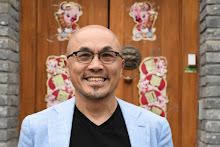Publish Post
October 24, 2007
Monday, October 22 was one of those major events in Chinese Communist history. It marked the conclusion of the 17th Chinese Communist Party Congress when China's top leaders for the next 5 years were chosen. Above is a picture of the leaders lined up on the stage at the Great Hall of the People, the building to the west of Tiananmen Square. The head honcho is Hu Jintao (5th from the left) who holds the most important positions: General Secretary of the Party, Chairman of the Party Military Commission, and President.
Below Hu is a group of 8 other guys who make up the Political Bureau (or Politburo) Standing Committee. These are the most powerful policymakers in the country with the final say on major policies. They include Wu Bangguo the head of the National People's Congress (4th from the right), Premier Wen Jiabao (4th from left), Jia Qinglin (3rd from the right) the head of the People's Consultative Congress, Xi Jinping (2nd from right) the head of the Party Secretariat and the vice-president, and Li Keqiang (2nd from left) the executive vice-premier.
The last two are the most interesting because they are slated to be the top two leaders five years from now. Xi is slated to succeed Hu as the top leader in 5 years, while Li Keqiang will replace Wen as premier, although none of this is written in stone.
What would be equivalent of the Politburo Standing Committee in the U.S.? Something like having President Bush, VP Cheney, Speaker of the House Pelosi, Senate Majority Leader, the Supreme Court Chief Justice, as well as the future prez (Hilary Clinton?) and vp (Barack Obama?) together in one body. And they would all be from the same political party.
This Party Congress was pretty tame as party congresses go. There were few surprises and most political observers got the final lineup right before it was announced on Monday. This suggests that there was little backroom infighting and no major power struggles in deciding who the top leaders would be. It was a smooth, predictable affair, something the Hu and the Party wanted the year before the 2008 Olympics.

No comments:
Post a Comment